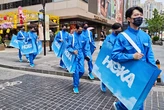Branded is a weekly column devoted to the intersection of marketing, business, design, and culture.
Elon Musk’s biggest headache is no secret: It’s Elon Musk. Long a controversial figure, Musk lately seems to have made polarization his central project, from his close alignment with Donald Trump and government wrecking-ball efforts to his wild posts on X and personal life. He’s increasingly unpopular. And it’s all done undeniable damage to his flagship consumer-facing enterprise, Tesla. With sales suffering and its cars and dealerships becoming protest targets, it’s now an open question as to whether the pioneering EV maker’s once-enviable brand can be restored.
The extent of the damage will be quantified when Tesla reports its first-quarter results next week, but the outlines are clear enough. Sales of Tesla’s flagship vehicles have flagged in Europe and China, and the brand is facing stiffer competition from U.S. rivals; it has already disclosed a 13% plunge in global vehicle deliveries for the quarter. In EV-friendly California, Tesla registrations are down 15%—even as EVs overall rose 7.3%. Tesla trade-ins have soared to a reported 250%, with car-shopper interest in buying a new Tesla at its lowest point in years. The much-hyped Cybertruck has missed sales targets, been subject to a string of recalls, and become a magnet for anti-Musk vandalism. (You know it’s bad when your brand gets attacked at Mardi Gras.) Tesla showrooms have become sites of nationwide “Tesla Takedown” protests that yoke the brand to Musk’s political activities. Its share price has plunged from a high of nearly $490 in December to less than $250 this week.
Wedbush Securities analyst Dan Ives recently summarized the upshot as a “brand crisis”: “The more Musk is attached to the Trump administration and DOGE, the brand damage goes from containable to permanent,” Ives recently told the Los Angeles Times. “Tesla has become a political symbol around the world and that’s not a good thing.” In a March Yahoo News/YouGov poll, 67% of respondents ruled out owning or leasing a Tesla, with 37% specifically citing Musk as a reason.
It’s difficult to find a pure parallel to a past mass-market brand crisis that boils down to widespread contempt for a CEO. But given how singularly the Musk personal brand is intertwined with Tesla’s, the most obvious solution would be to get some daylight between the two. Allen Adamson, cofounder of marketing consultancy Metaforce, recently told NPR that it “would probably be the best thing for the brand” if Musk cashed out of Tesla and walked away. “That’s the only easy fix, which is [Musk saying], ‘I’m selling it; I’m going to focus on other things I’m interested in.’ And the new ownership team is going to keep their eye on the ball.”
That’s highly unlikely. David J. Reibstein, a marketing professor at the Wharton School, suggested a similarly extreme strategy to Business Insider: Tesla could change its name and logo and essentially rebuild the brand to appeal to its original customer base, heavily made up of progressives concerned about climate change. As precedent, he pointed to ValuJet Airlines. After one of its planes crashed in Florida in 1996, killing 110 people, it acquired AirTran Airways and dropped the ValuJet name and brand.
This also sounds implausible. But it’s worth noting that Musk-founded SpaceX has been notching accomplishments and avoiding pop culture punching-bag status. It is widely seen as the Musk property with the strongest non-Musk manager: president and chief operating officer Gwynne Shotwell, who oversees daily operations. It does seem plausible that if Musk could find a similar figure for Tesla it would at least begin to put some distance between his caustic political views and Tesla’s original innovative and progressive brand. This might also begin to address investor concerns, which include not only the tarnished Tesla brand, but the sense that Musk simply isn’t paying enough attention to it: If the self-proclaimed “nano-manager” has other priorities, it would be reassuring to have someone more focused in the driver’s seat.
Or, of course, Musk could simply knock off the political theatrics (he will supposedly leave DOGE in the next month or so) and put in the work to rebuild a connection between Tesla’s brand and the sizable chunk of his potential customer base that he’s alienated. This would take time, and there’s no guarantee it would work. Among other things, it would require really recognizing that the brand is at risk (which he might)—and being transparent about efforts to set it back on course. That’s an almost universal step in the playbook for bouncing back from a brand crisis, as varied as Volkswagen’s 2015 “dieselgate” scandal, which involved manipulating emissions-test results, to H&M releasing a racially offensive ad in 2018. Admit the problem(s), demonstrate how you’re solving them, focus on core values, and recognize that the process will take time.
Of course those aren’t pure analogues, as the Musk/Tesla brand challenges are so distinct. Moreover, Musk has historically been skeptical of traditional brand communication, from advertising to press relations, relying on buzz and word of mouth from a zealous customer base. And that strategy has mostly served him well. (Even in their depleted state, Tesla shares are still priced for extreme growth, trading at more than 100 times forward earnings; a chunk of investor fans are no doubt bullish on the company’s robotics and self-driving technology, which are less dependent on consumer brand reputation.)
In other words, any strategy that involves acknowledging the crisis, and Musk’s culpability for it, still seems like a long shot for now. To date, Musk has done only what the current political zeitgeist seems to default to lately when faced with undeniable problems: Deny them.








No comments